Translation of idioms英语习语翻译
体育英语中常用习语的翻译

体育事业和文化的桥梁。然而,令广大中国观众和读者头
痛的是,英美国家的报刊杂志、广播等传媒的体育报道中 经常有大量的英语习语出现。只有弄懂这些习语的含义, 才能真正体会、理解报道的内容。为此,笔者探讨了习语 的定义、特点,并选取了体育英语中一些常用的习语,希 望通过对这些习语的历史渊源、涵义等方面的介绍可以对 读者在今后阅读体育报道时有所帮助。 1
中国西部科技
2007・09
体育黼常用习语的翻译
樊 云
(浙江师范大学外国语学院,浙江金华321 004) 摘要:习语是某一语言在使用过程中形成的独特的固定的表达方式,它存在于社会不同的专业和领域中,体育领域也不例外。本文 介绍了体育英语中常用的一些习语,并针对其翻译方法和途径提出了几点建议。 关键词:体育英语;习语;翻译 Translation of Idioms Frequently Used in Sports English
其含义、感情色彩以及形象都和我们汉语里的“事后诸葛
亮”相同。
4.3意译法
翻译过程中,若直译效果不好,套用又无合适的汉语 习语时,可采用意译法,把英语习语的含义表达出来。例 如“high five”,这是比赛场合经常见到的一个动作,是 两个人一起做的手势,各自把一个手伸得高高的,然后两 人把手掌相对用力拍一下。译成汉语时,我们可以采用意 译的方法,把它翻译成“举手击掌,通常用来表示胜利的 一种手势语”。 上面我们简略探讨了一下有关体育英语中的常用的一 些习语及其翻译方法,希望对广大的体育工作者和爱好者 在阅读有关体育的英语报道时有所帮助。近年来,我国体 育事业已开始转向市场化,国际体育交流日益频繁,而体 育翻译和研究工作却相对滞后。从某种意义上来说,体育 翻译工作的好坏,已经关系到我国体育事业的进一步腾飞 和对外开放的进一步扩大。因此,我们要大力加强体育翻 译的研究工作,为我国体育界做出自己应有的贡献。 参考文献:
英语专业英译汉 第十章.习语的翻译

At breakfast, eat like a king. 早饭吃饱。 At lunch, eat like a prince. 中饭吃好。 At supper, eat like a pauper. 晚饭吃少。 Rolling stone gathers no moss. 滚石不生苔(搬家不聚财)。 under the counter (table) 鬼鬼祟祟
1 21 返回章重点退出 返回章重点退出
习语翻译
补充练习
14.I heard my master mounting the stairs —— the cold sweat ran from my forehead: I was horrified.
(Emily Brontë Wuthering Heights) :
1 11 返回章重点退出 返回章重点退出
1. 3 释义法 (Explanation Translation) 释义法是以忠实通顺地表达原习语的思想、内容、 意义为目的,采用解释说明手法,表达原习语在上下 文中的涵义。一般对原文中的习语,不逐字逐句地去 翻译,而是按语义、修辞或句法的需要,增加一些解 释说明的词,补充完善原习语的意思。释义法翻译一 般用在双语文化或语言的差异很大,译入语难以直接 表达的场合。
1 19 返回章重点退出 返回章重点退出
习语翻译
补充练习
6) wash one’s hands of a thing 【译】洗手不干……;与……断绝关系 7) have a ball at one’s foot 【译】有成功的机会 8)to live a cat-and-dog life 【译】过着不和谐的生活(过着猫狗般的生活) 9)to keep one’s head above water 【译】奋力图存;勉强凑合过日 10)When in Rome, do as the Romans do. 【译】到什么山,唱什么歌。(入乡随俗)
(translation of idiom)
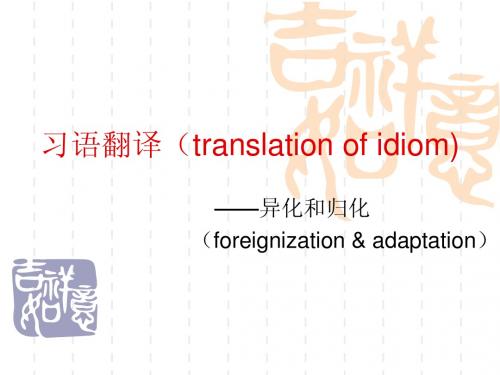
三)、习语中所含的文化词语表达的是一种原 语文化中独有的风俗、信仰、价值观和审美观。 例:Unkissed,unkind.不接吻,不友善。
(这是西方特有的 “吻面礼”,此处要是 用归化法翻译——“不作揖,不友善”,就 会失去异域文化的独特性)
直译加注
直译加注可以对文化信息作必要的补充和 解释,既可采用文中加注,也可以采用脚 注,或二者合一。 例:This was a rag to the bull [1].பைடு நூலகம்这简直就 是朝公牛摇晃红布(火上浇油)。 This was a rag to the bull [1].这简直就是朝 公牛摇晃红布。 [1].火上浇油
C.有些英语习语无固定译法,只能根据具体语境和 上下文灵活处理。 Jack owned David a dollar ,so he borrowed another from Joe to pay David back .He robbed Peter to pay Paul. 杰克欠戴维一美元,他于是向乔借了一美元去还 给戴维.这是借东家还西家. Trying to study a lesson for one class during another class is like robbing Peter to pay Paul. 要在这节课里学习那节课的内容是挖东墙补西墙。
Examples:
I don’t know what to do next. Let’s play it by ear.到时候再决定/顺其自然吧。 ear.到时候再决定/ He will laugh his head off. off. 他会笑掉大牙的。
“归化”和“异化”各有其长,亦各有其 短。两种译本对读者所起的作用不一样, 其所完成的翻译目的也不一样,所适应的 读者群也不一样。
习语、外来语的翻译
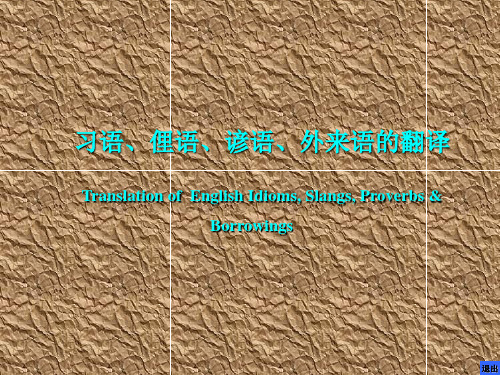
Translation of English Idioms, Slangs, Proverbs & Borrowings
退出
习语的翻译
(Translation of English Idioms)
英语习语是一个比较宽广的范畴,是经过长
时间的使用而提炼出来的固定短语或短句,是人 类从劳动中创造出来,和民族的历史背景、经济 生活、地理环境、风俗习惯、心理状态紧密相关, 把丰富的思想内涵精辟地表达出来,言简意赅、
风格和异域文化特色、文化意象,对原习语的表现 形式和意义原则上不做任何调整。鲁迅先生说过: “竭力想保存原书的口吻,大底连语句的词语也不 甚颠倒”。这也许就是直译的意思。
7 返回章重点退出
a die-hard think tank time frame the hot line paper tiger armed to the teeth comfort woman to burn one’s boats to fan the flame(s) to turn a deaf ear to to have a well-oiled tongue a gentleman’s agreement
人生如梦。
返回章重点退出
12
Give him an inch and he’ll take an ell. 得寸进尺。 Beauty is in the eye of the beholder. 情人眼里出西施。 He spent money like water. 他花钱跟流水似地。 An idle youth,a needy age. 少壮不努力,老大徒伤悲。 While there is life, there is hope. 留得青山在,不怕没柴烧。
汉语成语翻译

(7).谚语俗语 谚语俗语 有些成语是群众口头中使用的谚语或俗语。 A. 亡羊补牢 Mend the fold after the sheep is stolen. B. 敝帚千金 cherish an old broom as if it were a thousand pieces of gold—cherish a possession of little value.
2) Literal translation with annotations直译加注有些习 直译加注
语含有比喻意义、象征意义或是历史典故等) 语含有比喻意义、象征意义或是历史典故等
a.木已成舟:The wood is already made into a boat—what’s done is done. b. 杞人忧天: Like the man of Chi who was haunted by the fear that the sky might fall—unnecessary anxiety. c . 朝秦暮楚: Serve the State of Qin in the morning and the State of Chu in the evening—playing fast and loose (quick to switch sides)
(6)人民群众用过的精炼词组 人民群众用过的精炼词组
成语中绝大部分是人民群众创造的,其中有一些 具有浓厚的口语色彩和生活气息。
A. 大海捞针 look for a needle in a bunch of haystack B. 指桑骂槐 point at the mulberry and abuse the locust—point at one but abuse another (literal +annotation) make oblique accusations (free)
意译加注法的例子
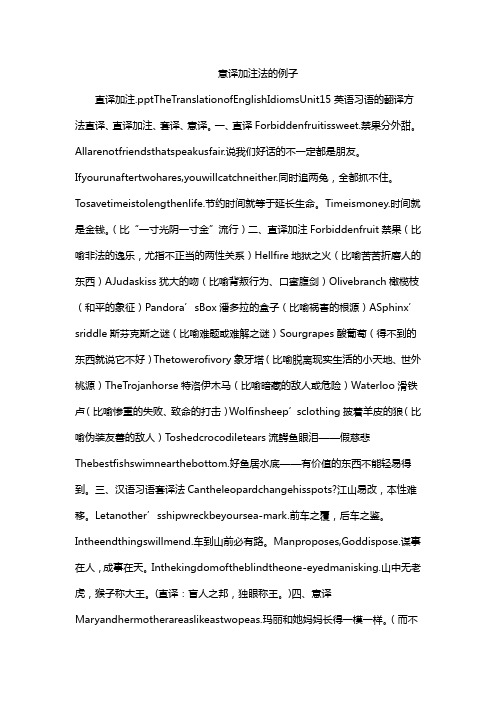
意译加注法的例子直译加注.pptTheTranslationofEnglishIdiomsUnit15英语习语的翻译方法直译、直译加注、套译、意译。
一、直译Forbiddenfruitissweet.禁果分外甜。
Allarenotfriendsthatspeakusfair.说我们好话的不一定都是朋友。
Ifyourunaftertwohares,youwillcatchneither.同时追两兔,全都抓不住。
Tosavetimeistolengthenlife.节约时间就等于延长生命。
Timeismoney.时间就是金钱。
(比“一寸光阴一寸金”流行)二、直译加注Forbiddenfruit禁果(比喻非法的逸乐,尤指不正当的两性关系)Hellfire地狱之火(比喻苦苦折磨人的东西)AJudaskiss犹大的吻(比喻背叛行为、口蜜腹剑)Olivebranch橄榄枝(和平的象征)Pandora’sBox潘多拉的盒子(比喻祸害的根源)ASphinx’sriddle斯芬克斯之谜(比喻难题或难解之谜)Sourgrapes酸葡萄(得不到的东西就说它不好)Thetowerofivory象牙塔(比喻脱离现实生活的小天地、世外桃源)TheTrojanhorse特洛伊木马(比喻暗藏的敌人或危险)Waterloo滑铁卢(比喻惨重的失败、致命的打击)Wolfinsheep’sclothing披着羊皮的狼(比喻伪装友善的敌人)Toshedcrocodiletears流鳄鱼眼泪——假慈悲Thebestfishswimnearthebottom.好鱼居水底——有价值的东西不能轻易得到。
三、汉语习语套译法Cantheleopardchangehisspots?江山易改,本性难移。
Letanother’sshipwreckbeyoursea-mark.前车之覆,后车之鉴。
Intheendthingswillmend.车到山前必有路。
英语成语翻译

The Translation of Idioms--by Wu Xiaofei, Hu Ping, Fu Mei Thank you very much. Honorable Mr. Zhang, Ladies and gentleman, Good morning!I am very happy to have this chance to give my presentation.As you see, our theme is the translation of idioms.Firstly, I would like to talk about the definition of the terms I shall use in my presentation.DefinitionIdioms are words, phrases, or expressions that cannot be taken literally.In other words, when used in everyday language, they have a meaning other than the basic one you would find in the dictionary. Every language has its own idioms. Idioms are set phrases or short sentences that are unusual either grammatically or semantically for their meanings cannot be derived from the conjoined meaning of its elements, as in “It’s raining cats and dogs!”Background informationAs we all know, idioms can somehow reflect characteristics of culture. The Chinese and English idioms are actually the typical examples. I’d like to show the differences as follows.1.Differences of comparison (比喻)中国人常常用成语“雨后春笋”来形容一般事物的迅速发展和大量涌现。
10.习语、俚语、谚语、外来语的翻译
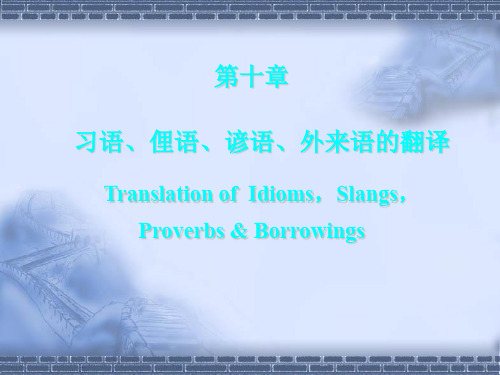
返回章重点退出
1. 就下列范围写谚语,每组至少要写出2-3条
4) education Teaching others teaches yourself. 教学相长。 A child’s back must be bent while it is young. 修树须趁早,育人要趁小。 Better unborn than unbred. 与其不管教,不如莫生育。 Like teacher, like pupil. 严师有高徒。 Think more, and you’ll become wiser. 多思出智慧。
15.S-hook
S形钩子
16.T-shirt
T恤衫
17.An American in 《华都舞影》(影片名)
Paris
18.The Arrival
《外星人入侵》(影片名)
19.At First Sight 《真情难舍》(影片名)
20.Attack Force Z 《Z字特攻队》(影片名)
小节结束
16 返回章重点退出
A. 加油站
B. 服务站
17.shake a wicked leg
A. 跳舞
B. 扭动了一下残废的腿
18.shut-eye
A. 瞎子
B. 睡觉
19.side-wheeler/ southpaw
A. 车辆侧轮
B. 左撇子
20.soft soap
A. 拍马屁
B. 香皂
正确答案:16A 17A 18B 19B 20A
1. 就下列范围写谚语,每组至少要写出2-3条
1)life
Moderation in all things.
生活要节制。/凡是都要适可而止。
汉译英--习语翻译
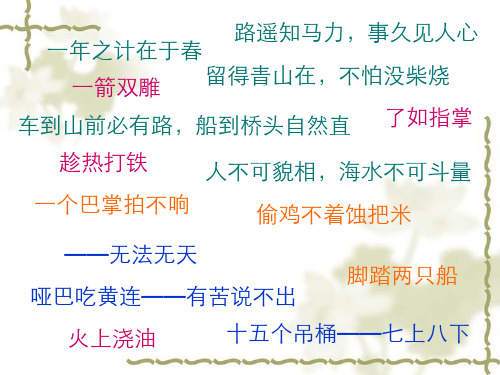
自食其果 eat the bitter fruit of one's own making
坏蛋
bad egg
人善被人欺,马善被人骑 All lay load on the willing horse.
赴汤蹈火 go through fire and water
把黑的说成白的 swear black is white (颠倒黑白,不择手段)
➢ If you run after two hares you will catch neither. →To run after two hares.
➢ It's no good crying for spilt milk. →To cry over spilt milk. / The milk is spilt. / spilt milk
➢ call a spade a spade
➢ as sure as eggs is eggs
➢ Diamond cut diamond.
➢ They that know nothing fear nothing. ➢ Never trouble trouble until trouble troubles you. ➢ 利用对仗:只许州官放火,不许百姓点灯;路遥知马力,日久见人心;狼吞虎咽;
Features of Idioms
➢ 6、由于各民族的文化和思维有着巨大的“共核”(common core),英汉习语有 时有惊人的相似之处。 ➢ 喻义相同,结构相同: 了如指掌 To know something like the palm or back of one’s hand 火上浇油 to pour oil on the flames / add fuel to the flames 滴水石穿 Constant dropping wears the stone. 浑水摸鱼 to fish in the troubled waters 自吹自擂 blow one's own trumpet 空中楼阁 castle in the air 破釜沉舟 to burn one’s boats 如履薄冰 be skating on thin ice 晴天霹雳 like a bolt from the blue 趁热打铁 to strike while the iron is hot 熟能生巧 Practice makes perfect. 时间不等人 Time and tide wait for no man. 时间就是金钱 Time is money. (耳听为虚), 眼见为实 Seeing is believing. 隔墙有耳 Walls have ears.
Lesson 8 习语的翻译
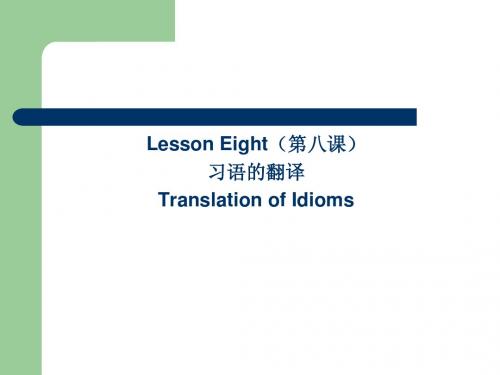
III. Translation of idioms
1. Corresponding idioms There are some English idioms corresponding to ready-made idioms both in meaning and in structure. Such idioms can be turned into corresponding Chinese ones and vice versa. 1) In ancient times if a man’s eye was put out by his enemy, he might get revenge by putting his enemy’s eye out. This was the rule of an eye for an eye and a tooth for a tooth.. 2) You pretended that you were helping them out of their difficulty, but actually you are pouring oil on the fire and making matters worse. 3) If it is a wet summer the firm making mackintoshes will find good markets, if there is a heat wave there will be a special big demand for bathing suits, if we have shares in both we need not feel unduly anxious about the weather, for what we lose on the swings we shall gain on the roundabouts. 4) Wall has ears. 5) a bolt from the blue
Group 7

Corresponding translation/ Borrowing 套译法 He spent money like water. 他花钱跟流水似地。 他花钱跟流水似地。 An idle youth,a needy age. , 少壮不努力,老大徒伤悲。 少壮不努力,老大徒伤悲。 While there is life, there is hope. 留得青山在,不怕没柴烧。 留得青山在,不怕没柴烧。 Yang Yuhuan——Helen of Troy in China.
Free translation 意译法
Examples: At breakfast, eat like a king. to break the ice 打破沉默 早饭吃饱。 早饭吃饱。 to dog-ear a book At lunch, eat like a prince. 折书角 中饭吃好。 中饭吃好。 At supper, eat like a pauper. to hold one’s horse 忍耐 晚饭吃少。 晚饭吃少。 Rolling stone gathers no moss. 滚石不生苔(搬家不聚财)。 滚石不生苔(搬家不聚财)。 under the counter (table) 鬼鬼祟祟
Translation of English Idioms, Slangs, Proverbs & Loanwords
习语、俚语、谚语、 习语、俚语、谚语、外来语的翻译
Translation of English Idioms, Slangs, Proverbs & Loanwords
1 Translation of English Idioms 2 3 4 Translation of Slangs Translation of Proverbs Translation of Loanwords
Lecture 14 习语翻译

有许多习语在另一种语言里虽然没 有 意 象 相 同 的 对 等 用 法, 但 却 能 找到 意 象 不 同 而 意 义 相 同 或 相 近 的 习 语, 也就是说可以归化成译入语中固有 的习 语, 只 不 过 意 象 发 生 了 变 化, 而 原 文 的 意 义 基 本 未 变。
Translation of Idioms
习语翻译
英汉两种语言都富于生动形象的习语 , 英 汉 习 语 因 文 化 的 巨 大 差 异 而呈 现 出 各 自 独 有 的 特 色, 但 由 于各民族的 文 化 与 思 维有着巨大的“共核”(common core) ,所以英汉习语有时也有惊人的相似 之 处。 相 似 的 习 语 固 然 可 以 让 译 者惊 喜, 而 独 具 文 化 特 色 的 习 语 往 往 又 使 译 者 望而生畏。
Make hay while the sun shines. 抓紧时机 strike while the iron is hot. 趁热打铁。 Man proposes, God disposes. 谋事在人,成事在天。 Great minds think alike. 英雄所见略同。 burn one„s boats. 破釜沉舟。
一、异化译法
异化译法(Foreignization)就是保留原 文的文化意象(异国情调),也就是所 谓的直译法,目的是要使译文保持原 文的语言风格,向译文读者介绍源语 文化,并丰富译入语及其文化。
1) armed to the teeth: 武装到牙齿 2) an eye for an eye, a tooth for a tooth: 以眼还眼,以牙还牙。 3) a wolf in sheep's clothing:披着羊皮的狼 4) Kill two birds with one stone:一石二鸟 5) All roads lead to Rome: 条条大路通罗马 6) born with a silver spoon in one„s mouth: 嘴里衔着银匙出生的 7) a storm in a teacup: 茶杯里的风暴;小事惹起的轩然大波。
英语习语的理解与翻译
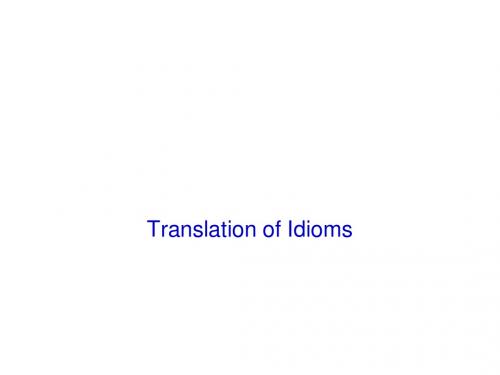
Translation of Idioms
• 在语言的发展过程中,人们经过长期的社会实践 提炼出一些固定的短语或短句,这就是习语,也 是语言的精华,是人们智慧的结晶。 • 英语习语从广义上讲,包括俗语 (colloquialism)、谚语(proverb)、俚语 (slang expression)等。
• 习语大多短小精悍、言简意赅、生动形象、通俗 意懂,是广大人民所喜闻乐见的一种形象化的语 言,不仅具有浓郁的民族和地方色彩,还集中体 现了语言中的各种修辞手法。因此在翻译习语时, 除了要忠实地表达出原文的含义外,还应该尽可 能地保留原文的丰富联想、形象比喻以及地方色 彩等。 • 英语的习语翻译通常采用四种方法:直译法、直 译加注法、套译法和意译法。
• 五、英语习语翻译中值得注意的问题
• 英语习语的译文并不是唯一的。 英语习语的译文并不是唯一的。 • 英汉两种语言的习语中有许多带有浓厚的民族色 或者包含某些人名和地名, 彩,或者包含某些人名和地名,这些习语在英汉 两种语言中通常是不能互相替换的。 两种语言中通常是不能互相替换的。 • 英语习语的翻译不可望文生义。 英语习语的翻译不可望文生义。 • 准确理解英语习语,弄清褒贬之分。 准确理解英语习语,弄清褒贬之分。
• 一、直译法
• • • • • 采用直译的习语多半是英语和汉语在比喻和形 象方面基本相同的 to add fuel to the flames 火上加油 to be on thin ice 如履薄冰 walls have ears 隔墙有耳 a stony heart 铁石心肠
• 二、直译加注法 • 有些习语还含有比喻意义、象征意义或历史典故 等,在翻译的时候一般要在其后加注进行解释。 • Crocodile tears 鳄鱼的眼泪(假慈 悲) • The tower of ivory 象牙塔(脱离现实 的小天地) • Waterloo 滑铁卢(惨败的事件) • Wolf in sheep’s clothing 披着羊皮的狼 (伪善的敌人)
第七讲 习语的翻译1

• •
• • •
• • • • •
•
英汉习语中所反映的文化差异表现(习语的来源) : 包括四个方面:地理环境;传统习俗;宗教信仰;历史典故 1.地理环境对习语文化的影响。 习语的形成与人们的劳动生活密切相关。 英国是一个岛国,人们的生活以航海打渔为主;而汉民族生活在亚洲大陆东部, 地处北温带,气候比较温和,人们的生活与土地有着不可分割的关系。由于自然 环境和地理上的差异,中国人和西方人对同一词汇的理解、联想也有所不同。 例如,在形容一个人非常奢侈浪费时,英语是“spend money like water”,而汉 语是“挥金如土”。 中国是一个内陆国家,幅员辽阔,有许多名山大川,因此有许多与山有关的成语, 如“安如泰山”,“开门见山”,“江山易改,禀性难移”及“留得青山在,不愁 没柴烧”等。而在英语中则有许多有关于船和海的习语,在汉语中找不到与之 完全对应的习语。如“all at sea(不知所措)”,“in deep water(陷入严重困 境)”,“when one‘s ship comes home(当某人发财时)”,“water under the bridge(无法挽回的过去)”,“be of the first water(第一流的)”等。 而且,地域不同,各地自然景观亦各有特点,具体反映在语言上也有所不同。 在用自然景观或物体来作比喻时,语言间就存在着明显的差异。如在汉语中有 “有眼不识泰山”、“不到黄河心不死”、“不到长城非好汉”等。而在英 语中则有“All roads lead to Rome”,“Take a French leave”,“Carry Coals to Newcastle(把煤送到纽卡斯尔,此地盛产煤,意为多此一举)”,“go Dutch”等。
•
相关理论与概念:
- 1、下载文档前请自行甄别文档内容的完整性,平台不提供额外的编辑、内容补充、找答案等附加服务。
- 2、"仅部分预览"的文档,不可在线预览部分如存在完整性等问题,可反馈申请退款(可完整预览的文档不适用该条件!)。
- 3、如文档侵犯您的权益,请联系客服反馈,我们会尽快为您处理(人工客服工作时间:9:00-18:30)。
• An idiom is an expression whose meaning is not
predictable from the usual grammatical rules
of a language or from the usual meanings of its
constituent elements. (Random House Webster’s
A
2
Idiom
• Feature
• Culturally relative: An idiom is generally a colloquial metaphor—a term requiring some foundational knowledge, information, or experience, to use only within a culture, where conversational parties must possess common cultural references. Therefore, idioms are not considered part of the language, but part of the culture.
fish in the moat.
• 路遥知马力,日久见人心
译文:As a long road tests a horse’s strength, so a
long task proves a person’s heart.
A
8
• 初生牛犊不怕虎
译文:New-born calves make little of tigers.
College Dictionary )
A
4
Translation of idiom
• Foreignizing translation:
– retaining the cultural flavors of the SL
– enables the reader to have an alien reading experience
• 口蜜腹剑
译文:to be honey-mouthed and dagger-hearted
• 声东击西
译文:to shout in the east and strike in the west
• 望梅止渴
译文:quench one’s thirsty by thinking of plums
• 画饼充饥
– developing the readers awareness of cultural difference
• Domesticating translatห้องสมุดไป่ตู้on:
– minimizes the foreignness of the SL text by changing the heterogeneous elements into what is familiar to the TL text
A
5
• 异化:主张直译原文的语言形式(即便 这种语言形式不完全切合译语习惯), 保留构成原语言的文化因子(主要是形 象)。
• 归化:主张以纯熟地道的译语和相关联 的文化因子进行翻译。
A
6
Translation of idiom (C-E)
• Foreignizing translation
• 剖腹藏珠 出自《资治通鉴·唐纪·太宗贞观元年》: “吾闻西域贾胡得美珠,剖身以藏之,有诸?”
A
3
Idiom
• An idiom is an expression not readily analyzable from its grammatical construction or from the meaning of its component parts. It is the part of the distinctive form or construction of a particular language that has a specific form or style present only in that language. (New International Webster’s Collegiate Dictionary )
A
7
• 明枪易躲,暗箭难防
译文:It is easy to dodge a spear in the open, but
hard to guard against an arrow shot from
hiding.
• 城门失火,殃及池鱼
译文:A fire on city wall brings disaster to the
译文:to draw cakes to allay hunger
A
9
• 刻骨铭心
译文:to be engraved on one’s heart and bones
• rip open the stomach and hide a pearl—sacrifice life for money
• 你自己手里拿着这个,岂不好?明儿再送来。——就 失了手也有限的,怎么忽然又变出这“剖腹藏珠”的 脾气来!(《红楼梦》)
• 译文:Wouldn’t that be better? You can send it back later. And even if want to “cut open your stomach to hide a pearl”?
Chapter Fifteen
Translation of Idioms
A
1
Idiom
• Definition • An idiom is an expression, word,
or phrase that has a figurative meaning that is comprehended in regard to a common use of that expression that is separate from the literal meaning or definition of the words of which it is made.
